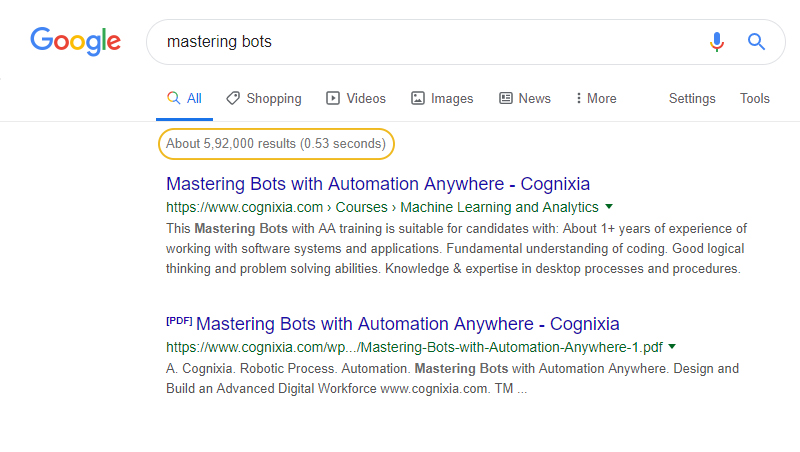
“Data is a precious thing and will last longer than the systems themselves.”
– Tim Berners-Lee (inventor of the World Wide Web)
We live in an era where the amount of data has exceeded the total number of humans. A survey done by the University of Southern California (USC) has revealed that the total generation of data has reached 295 billion gigabytes (GB) and is increasing exponentially every minute. Compared to this, the total number of humans on earth is just 7.5 billion, while approximately 2.5 billion GB data gets created every single day.
“The world is now awash in data and we can see consumers in a lot clearer ways.” Max Levchin, PayPal co-founder.
Companies today have found a very productive way of running their business successfully. They are learning from data and evolving to be strategically stronger.
Ever wondered how Google provides super appropriate and accurate search results in less than a second?


How does the internet know what kind of music does a person like, or recommend the perfect series or shows he must be interested in?
Why does a person get to see advertisements for the products he was surfing online but has not order yet?
How are companies able to target the correct and most appropriate customers, increasing the chances of getting the deal done?
How does the internet recommend the hotel, which puts ticks to all the specifications a person was looking?
We all can relate to these questions. It seems like the internet is spying on everyone!
Data Science has made it all possible
The answer to all the questions asked above is Data Science and the fields related to it. With digitalization taking over, the majority of the data resides on the Cloud rather than on hardware. The data stored is in many forms- structured, unstructured, clustered, unclustered, and in various formats like images, documents, spreadsheets, etc. This Big Data when processed and analyzed acts like a key to unlock the strategies for business.
“Without Big Data analytics, companies are blind and deaf, wandering out into the web like deer on a freeway.” – Geoffrey Moore, author, and consultant.
Along with the advancements like Machine learning, Automation, IoT, DevOps, etc. the definition of data science is ever evolving. Technically, Data science is a multi-disciplinary field that uses scientific methods, processes, algorithms, and systems to extract knowledge and insights from structured and unstructured data. For these tasks to be carried out, we have various tools that provide with the right environment and algorithms to process data. A few of the many tools available to carry out the task are, R Programming, SAS, Apache Spark, QlikView, Splunk, Python, etc. They have algorithms that process and analyze your data to give a report that provides Past analysis report, recent activity reports, and the futuristic reports. These reports provide the company the direction to device correct and most appropriate strategical solutions.
“The goal is to turn data into information, and information into insight.”
– Carly Fiorina, former executive, president, and chair of Hewlett-Packard Co.
Why is Python preferred over other data science tools?
Open Source: Python is an open source programming language. It is easy-to-read and very powerful.
Learning is easy: The most tempting feature of Python is that it is very easy to learn. With its easy-to-understand syntax, anyone can learn this language in a quick and easy manner.
Integration: A python build can integrate well with all the cloud-based services like PaaS or SaaS. This gives it a large coverage in the Data Science world.
Can perform on large scale: It supports multi-processing, a privilege for parallel computing. This provides large scale advantages in areas like machine learning. It even provides the ease to extend modules with codes written in languages like C and C++.
Scalability: Compared to other languages, Python proves to be a more scalable language. It functions faster than languages like R, Matlab or Stata. Even YouTube moved to Python from PHP as it offered a rich set of syntax and provided many other useful benefits.
Great graphics and visualization: There are visualization packages provided, which help in creating charts, web-ready interactive plots, get a great sense of data and graphical plots, and enable superior analysis of the data.
The Community: Python has encouraged more and more people to participate and create abundant data science libraries. These libraries are easy to access and have opened the doors to innovation in processing and analyzing the data.
With all these advantages Python is undoubtedly the ‘Swiss Army Knife’ in the world of coding. Supporting the object-oriented programming approach, it has excelled in creating amazing programming patterns.
When Guido Van was creating Python, he was also reading published scripts of the then famous BBC comedy series- ‘Monty Python’s Flying Circus’. Thus the name-Python, as he wanted a name that was unique, a little mysterious and short.
Python is thus, the key to many locks, be it a career or a business. At Cognixia, we provide trainings that are thoroughly crafted and customized to take you ahead in your career and business path. With industry experienced trainers, the course is devised with a keen perspective of the application world. Businesses today are hawking for experts in this field but the mere shortage of the right skilled people has made the IT industry to explore new avenues to get the right talent in place. Come; explore our course – Data Science with Python now!


